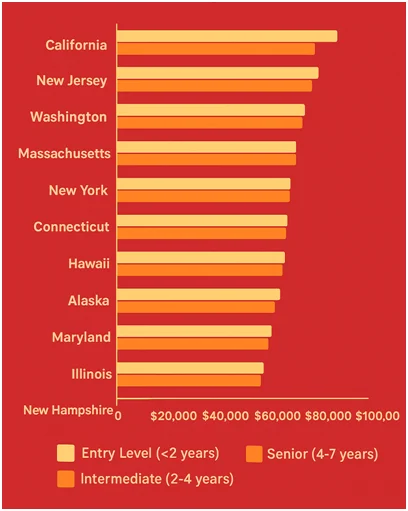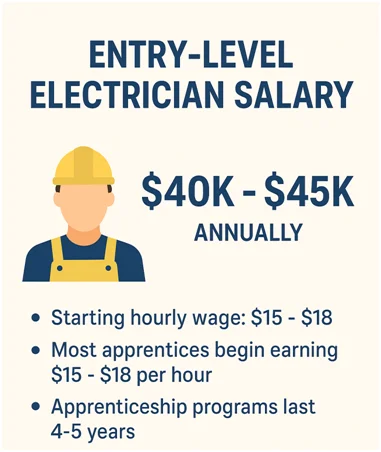Last Updated on November 17, 2025 by admin
Electricians earn strong wages across the United States today. The electrician salary varies widely depending on your location. Most electricians make between $45,000 and $95,000 per year. However, the highest-paying states for electricians offer much better compensation. Your earnings depend on your experience, certifications, and the location where you work. This guide shows you exactly how much electricians make nationwide.

The typical electrician’s salary ranges from $57,787 to $62,350 yearly. That translates to roughly $28 to $30 per hour. Entry-level electricians start around $40,000 to $45,000 annually. Experienced professionals can easily earn $70,000 or more each year.
The national average electrician salary currently stands at approximately $60,000 per year. Meanwhile, some states pay electricians nearly $100,000 each year. Location makes the most significant difference in your take-home pay. Additionally, your license level and specialization have a substantial impact on your earnings.
Furthermore, electricians can increase their income through overtime and specialized work. Many electricians add $8,250 per year just from overtime alone. Therefore, your specialization has a direct impact on your overall earnings as an electrician.
Union electricians generally earn higher wages than non-union workers consistently. Union jobs provide better benefits and retirement plans as well. Most union electricians make 10-20% more than their counterparts.
| State | Entry Level (<2 years) | Intermediate (2-4 years) | Senior (4-7 years) |
| California | $66,300 | $77,800 | $83,800 |
| New Jersey | $65,200 | $76,500 | $82,500 |
| Washington | $64,900 | $76,200 | $82,100 |
| Massachusetts | $64,300 | $75,500 | $81,300 |
| New York | $63,700 | $74,800 | $80,600 |
| Connecticut | $63,200 | $74,200 | $80,000 |
| Hawaii | $62,800 | $73,700 | $79,400 |
| Alaska | $62,300 | $73,100 | $78,800 |
| Maryland | $62,100 | $72,900 | $78,600 |
| Illinois | $61,800 | $72,500 | $78,200 |
| New Hampshire | $61,600 | $72,300 | $77,900 |
| Oregon | $61,500 | $72,200 | $77,800 |
| State | Entry Level (<2 years) | Intermediate (2-4 years) | Senior (4-7 years) |
| Colorado | $61,300 | $71,900 | $77,500 |
| Delaware | $61,200 | $71,900 | $77,400 |
| Virginia | $61,300 | $71,900 | $77,500 |
| Minnesota | $60,900 | $71,500 | $77,000 |
| Rhode Island | $60,900 | $71,500 | $77,000 |
| Pennsylvania | $60,300 | $70,800 | $76,300 |
| Texas | $60,300 | $70,800 | $76,300 |
| Michigan | $59,500 | $69,900 | $75,300 |
| Georgia | $59,400 | $69,700 | $75,100 |
| Arizona | $59,200 | $69,500 | $74,800 |
| North Carolina | $59,200 | $69,500 | $74,900 |
| Nevada | $59,300 | $69,600 | $75,000 |
| Utah | $59,000 | $69,200 | $74,600 |
| Wisconsin | $59,000 | $69,200 | $74,600 |
| Maine | $58,800 | $69,000 | $74,300 |
| New Mexico | $58,700 | $68,900 | $74,200 |
| Missouri | $58,600 | $68,700 | $74,000 |
| Louisiana | $58,400 | $68,600 | $73,900 |
| Ohio | $58,400 | $68,500 | $73,800 |
| Florida | $58,300 | $68,400 | $73,700 |
| Indiana | $58,200 | $68,200 | $73,500 |
| Kansas | $58,100 | $68,200 | $73,500 |
| State | Entry Level (<2 years) | Intermediate (2-4 years) | Senior (4-7 years) |
| Tennessee | $57,800 | $67,900 | $73,100 |
| Nebraska | $57,600 | $67,600 | $72,900 |
| North Dakota | $57,500 | $67,400 | $72,600 |
| Idaho | $57,400 | $67,400 | $72,600 |
| Oklahoma | $57,300 | $67,200 | $72,400 |
| South Carolina | $57,300 | $67,200 | $72,500 |
| Vermont | $57,300 | $67,300 | $72,500 |
| Iowa | $57,200 | $67,100 | $72,300 |
| Kentucky | $57,200 | $67,100 | $72,300 |
| Alabama | $57,000 | $66,900 | $72,100 |
| Montana | $56,900 | $66,700 | $71,900 |
| Arkansas | $56,000 | $65,700 | $70,800 |
| South Dakota | $56,000 | $65,800 | $70,900 |
| Mississippi | $55,400 | $65,100 | $70,100 |
| West Virginia | $55,000 | $64,600 | $69,600 |
| Wyoming | $55,000 | $65,100 | $70,100 |
Your experience level dramatically affects your electrician’s hourly rate and salary. Let me break down earnings at each career stage in clear terms.
The entry-level electrician salary typically ranges from $40,000 to $45,000 per year. Most apprentices initially begin earning $15 to $18 per hour. First-year apprentices make the least while they learn the trade. However, wages increase each year as you complete training requirements. You gain hands-on experience while earning a paycheck simultaneously. Most apprenticeship programs last four to five years in total. During this time, your electrician’s starting salary increases by $3,000 to $5,000 per year.
Second and third-year apprentices earn $45,000 to $55,000 annually. By your final apprenticeship year, you can make $55,000-$60,000. Moreover, you build valuable skills that last your entire career.

The salary of a journeyman electrician ranges from $55,000 to $75,000 per year. Most journeyman electricians earn between $26 and $36 per hour. You can work independently after passing your journeyman licensing exam. This independence opens up many more job opportunities for you.
Journeyman electricians with five to ten years of experience earn more. These experienced electrician salary figures often reach $70,000 to $80,000. Specializing in commercial or industrial work increases your earning potential. Additionally, obtaining specialty certifications enhances your marketable skills and increases your earning potential.
The master electrician’s salary typically ranges from $75,000 to $95,000. Some master electricians in high-paying states easily exceed $100,000 annually. Master electricians can supervise other workers and run businesses legally. This advanced license represents the highest achievement in the trade.
Master electricians often successfully start their own electrical contracting companies. Business owners can earn more than employed electricians overall. The average salary for an experienced electrician at this level ranges from $85,000 to $90,000.
Geographic location remains the single most significant factor in electrician compensation. Moving to a higher-paying state can increase earnings by $20,000 to $40,000. Urban areas generally pay more than rural locations for electrical work. However, you must weigh higher wages against increased living costs.
Your license level and certifications directly impact your earning power. Licensed electricians earn 20-40% more than unlicensed helpers on average. Employers seek electricians with diverse skill sets and credentials.
The type of electrical work you perform significantly affects your compensation. Industrial electricians typically earn more than residential electrician workers do. Experience and job tenure steadily increase an electrician’s salary over time. Most electricians see regular raises of 3-5% annually throughout their careers. Building a strong reputation ultimately leads to better job offers. Furthermore, experienced workers receive first consideration for overtime and premium jobs.
Union membership versus non-union status consistently creates substantial wage differences. Union electrician workers earn approximately 20% more on average nationwide. They also receive better health insurance and overall retirement benefits. On the other hand, non-union workers often have more flexible schedules.
Electrician Career Outlook and Job Growth
The future looks exceptionally bright for electricians across the nation right now. Demand for skilled electrician jobs continues to grow at a rate faster than average. The Labor Statistics bureau projects 6% job growth through 2032.
Several factors drive this strong demand for qualified electrician workers. First, the construction industry continues to expand in most regions currently. New homes, offices, and factories all need electrical system installations. This creates thousands of new electrician positions each year consistently. Second, the growth of renewable energy fuels demand for specialized electrician training workers. Third, aging infrastructure requires extensive repair and modernization work across the nation.
Older buildings often require electrical system upgrades to meet current building codes. This renovation work provides steady employment for experienced electricians everywhere. Infrastructure spending will continue to support electrician jobs for decades to come.
Fourth, the installation of electric vehicle charging stations creates entirely new opportunities. Businesses and homes are increasingly installing EV charging equipment that requires the services of electricians. This emerging market is expected to grow exponentially over the next decade. Early adopters of EV charging skills will command premium wages.
Moreover, many experienced electricians are reaching retirement age currently nationwide. This creates openings for younger workers entering the skilled trades. The electrician shortage means excellent job security for new workers. Employers actively compete for qualified electricians with better wages and benefits.
Additionally, becoming an electrician requires less time and money than college. Most electrician training programs take four to five years total. You earn cash during an apprenticeship instead of accumulating student debt. This makes the electrical trade an attractive career choice.
The combination of strong wages and job security makes electricians invaluable. Economic downturns tend to affect electricians less consistently than many other professions. People often require electrical repairs and maintenance work to be done properly. This recession resistance provides excellent long-term career stability and peace of mind.
Furthermore, the continuous integration of technology increases the complexity of electrical systems. Smart homes, automation, and advanced controls require the expertise of skilled electricians. These high-tech skills command premium wages in the current marketplace. Electricians who embrace technology will thrive in the years to come. That’s exactly what you get to learn in trade schools near you.
![]()
Now you understand the excellent salary potential available to electricians nationwide today. You have learned which states offer the highest compensation for workers. The path to becoming an electrician begins with finding the proper training.
Trade school programs combine daily classroom instruction with hands-on practical training. You learn electrical theory, code requirements, and real-world installation techniques. Most programs prepare you for apprenticeship opportunities with local employers.
Research the electrician license requirements in your specific state carefully before starting. Each state maintains different testing and experience requirements for licensing. Some states require four years of apprenticeship, while others need five. Understanding these requirements helps you plan your career path properly.
Learn the top qualities needed and start building your career as an electrician today to secure your financial future. The skilled trades offer stable, well-paying jobs that cannot be easily outsourced or relocated overseas. Your electrician skills remain valuable throughout your entire working lifetime. With dedication and continuous learning, you can achieve excellent earnings.
The electrician profession provides a clear path to middle-class prosperity. You can support a family comfortably on an electrician’s salary. Geographic flexibility enables you to relocate to where opportunities offer the best compensation. Whether you stay local or relocate, electrician jobs provide a secure career.
Take action now to begin your journey toward a rewarding career. Research schools, contact apprenticeship programs, and start learning the trade today. Your future as a well-paid, skilled electrician begins with that decision. The electrical trade requires motivated workers who are ready to learn and grow.
Read More-